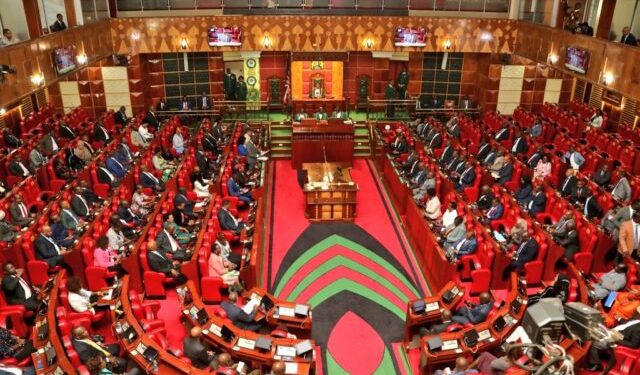The National Assembly’s Health Committee has cleared a KES 104.8 billion Safaricom-led digital health project, stating that it fully complies with procurement laws and government oversight mechanisms. This clearance follows scrutiny over the project’s tendering process, involvement of private firms, and the substantial contract size aimed at digitizing Kenya’s healthcare system.
In a press briefing held on September 30, 2024, the Chairperson of the Health Committee addressed concerns raised by lawmakers over the procurement process of the Integrated Information Technology System (IITS) for Universal Healthcare. The project, which is part of the government’s plan to operationalize the Social Health Insurance Act, No. 16 of 2023, had faced questions over legal compliance and Safaricom’s role as the lead partner.
“We raised concerns about the absence of a formal letter of consent from the Attorney General’s office, which is a legal requirement under Section 134(2) of the Public Procurement and Asset Disposal Act,” the Chairperson stated. However, the Ministry of Health provided formal clearance from the Attorney General, affirming that all legal requirements had been fulfilled.
The health committee also sought clarity on why Safaricom was chosen as the lead partner in the consortium executing the digital project. According to the Ministry of Health, Safaricom was identified as a strategic partner due to its strong technological capabilities and extensive network reach. The telecommunications giant leads a consortium including Apiero Limited and Konvergenz Network Solutions Limited.
The Ministry of Health emphasized Safaricom’s dominance in the region as a key factor in its selection. “Safaricom’s 5G network covers 77% of the Kenyan population, and their overall network spans over 99% of the country, including remote areas,” the Ministry said in its justification. Safaricom’s role is to manage and coordinate the project, ensuring that consortium partners deliver their respective components on time and within scope.
In addition to network coverage, the contract’s hefty KES 104.8 billion cost also drew scrutiny. Lawmakers questioned whether the amount was exclusively for the Social Health Insurance initiative. The Ministry clarified that the funds would cover several components necessary for a comprehensive digital healthcare system. These include the development of a Health Information Management System, telemedicine services, track-and-trace capabilities for pharmaceuticals, and digital health infrastructure.
Another point of contention was a potential conflict of interest regarding the law firm handling due diligence for the project. Initial reports suggested the involvement of Dentons Hamilton Harrison & Mathews, but the Ministry refuted these claims, clarifying that “due diligence was conducted by Kaplan & Stratton Advocates, ensuring an impartial review.” The Ministry further stressed that there was no conflict of interest affecting the project’s integrity.
Addressing concerns about connectivity in remote hospitals, the Ministry acknowledged that over 4,000 hospitals face power and internet issues. To counter this, hospitals will receive devices with power banks and a digital system capable of offline operation. Partnerships with the Ministry of Energy are also in place to improve infrastructure and guarantee uninterrupted healthcare services.
The Ministry also assured the Committee that it had prepared for potential system failures. “There are at least three connectivity lines available to support the system in case of failure,” they confirmed.
The project, set to roll out from October 1, 2024, aims to revolutionize Kenya’s healthcare system by integrating technology into service delivery. It is viewed as a critical part of the government’s broader Universal Health Coverage (UHC) agenda under the Social Health Insurance Act.
















